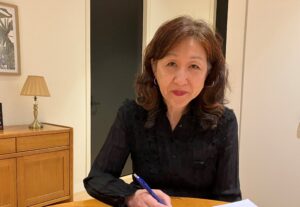
Lachlan Dean
10 March 2024
Joëlle Gergis. Humanity’s Moment: A Climate Scientist’s Case for Hope. Collingwood: Black Inc, 2022.
Growing up in the modern world is difficult. The access to information and the interconnectivity of the world makes everything seem very big, especially to me, at a time when my presence in the world, as a teenager is very small.
News and current events appear both very far away and uncontrollable, and very close, and impactful. Nothing affects the world right now quite like the changes in our global climate and environment seen in the past 20 years.
Dr Joëlle Gergis is an Australian climate scientist working at the Australian National University. She teaches two climatology courses and is a lead author for the IPCC’s Sixth Assessment Report. She is a textbook expert on this issue. In her latest book, Humanity’s Moment: A Climate Scientist’s Case for Hope, Gergis talks through the intricacies of climate change, exploring the science behind it, and the feelings behind it. She reminds us that it is okay to cry about this issue, and get angry about it, because humanity must be allowed to be human in this crucial moment.
Read more: Religious activists seek Pacific ties to tackle climate change
I found this book difficult to read because it peers into almost every aspect of what is likely one of the largest issues ever faced by humanity. Gergis walks through the future paths that lie ahead, explaining the science as she goes, and allowing the reader to feel the pain that she feels as these issues are laid bare.
I knew a bit about climate science before I read it, but now I see how much more complex the problems are, how much effort these scientists put into their work, and how little appreciation they get in return. Statistics and evidence are used in conjunction with anecdotes to describe the issues at hand.
As an Australian, Gergis discusses events including the Black Summer bushfires with deep emotion. One heartfelt story is that of the Wollemi Pines, some of the oldest trees in Australia, known as “living fossils”. These trees are only found in one valley in the Blue Mountains and were nearly all burnt to a crisp by the Black Summer bushfires. Specialist firefighters were helicoptered in when the fires got too close and set up a protective irrigation system to protect the last of this ancient species. It is personal anecdotes like these that Gergis uses to show us that the feelings about these issues cannot be ignored.
Read more: Christian teens care about mental health, climate change and Minecraft
Gergis also explores her feelings about these events with excerpts from her journal from various times in her career. She shows that the scientists that do this work are people with complex emotions and lives that have been affected by the work that they do. It is so easy to think of organisations like the International Panel on Climate Change as machines, but Dr Gergis shows that the IPCC is made of people who have devoted thousands of hours to reviewing tens of thousands of scientific papers and tens of thousands of technical comments over multiple years to construct the most scientifically accurate, up to date report on the situation of our planet. One fact that I was astounded to learn is that these scientists do this IPCC work for free, volunteering their time.
This book is a must-read, not only because it is enjoyable and informative, but because it is a guide to all things climate change for all people. It combines science, story and feeling into a display of the full human experience. It teaches us that with action by everyone, grassroots movements can drive the political and societal change needed to make the planet a better place for future generations. I feel like I have a friend in Joëlle Gergis, a fellow Australian trying to help everyone else understand the distressing truth and the reassuring future we can choose to have.
Lachlan Dean is a Year 12 student studying VCE Literature and Physics, with a passion for science and its role in solving problems in the world.
For more faith news, follow The Melbourne Anglican on Facebook, Twitter, or subscribe to our weekly emails.







